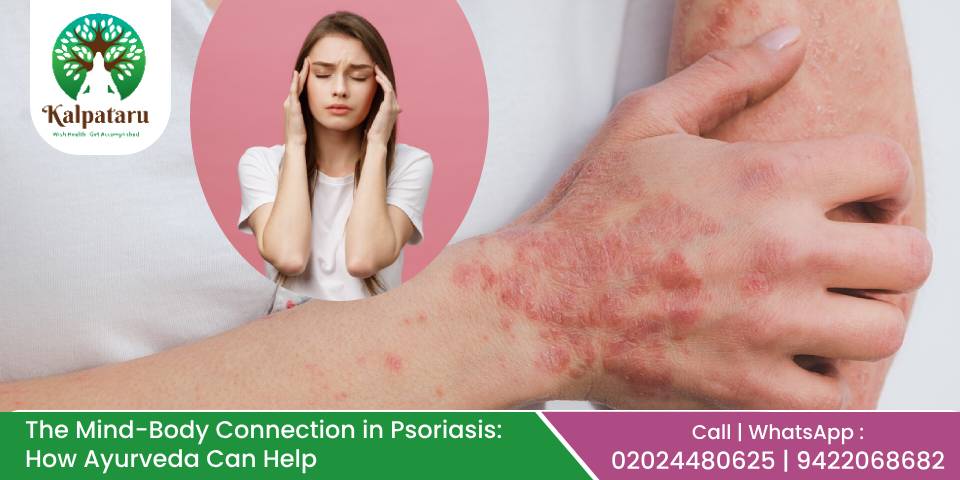Psoriasis is a chronic skin condition that affects approximately 2-3% of the global population. Characterized by red, itchy, and scaly patches on the skin, psoriasis can have a profound impact on a person’s physical and emotional well-being. Traditional medicine often treats psoriasis solely as a skin disorder, but recent studies have highlighted the significant role that the mind-body connection plays in its development and management.
In this blog, we will explore the mind-body connection in psoriasis and how Ayurveda, an ancient holistic healing system, can offer effective support for those dealing with this condition.
What is psoriasis?
Psoriasis is an autoimmune skin disorder in which the immune system mistakenly attacks healthy skin cells, causing them to multiply rapidly. This rapid cell turnover leads to the formation of thick, scaly patches that can be painful, itchy, and embarrassing for those affected. The exact cause of psoriasis is not fully understood, but factors like genetics, environmental triggers, and a compromised immune system are believed to play a role.
The mind-body connection in psoriasis:
Growing evidence suggests that psychological factors, such as stress, anxiety, and depression, can trigger or exacerbate psoriasis flare-ups. Stress can weaken the immune system and cause inflammation, which may aggravate psoriatic symptoms. Moreover, the emotional toll of living with a visible skin condition can lead to a negative impact on self-esteem and overall quality of life.
Psoriasis can often be exacerbated by family conflicts, stress, and financial challenges, leading to an increase in its severity. Such factors can play a role in both triggering the condition and worsening its complications. Therefore, effective management of psoriasis necessitates a comprehensive approach that focuses on mitigating mental stress and providing necessary psychological support. Establishing a strong support system within the family is essential in this regard. By implementing these measures, we can better address the impact of external stressors on the disease and promote overall well-being for those affected by psoriasis.
Psoriasis is a condition that significantly impacts both the physical and mental well-being of patients, leading to disruptions in their social lives. Engaging in simple activities like socializing with friends, visiting relatives, or even wearing casual clothing like T-shirts and shorts becomes a challenge for those suffering from psoriasis. The distressing stares and judgments from others further exacerbate their emotional state, causing them to experience feelings of despair. Hence, providing essential psychological support during the treatment of psoriasis becomes of paramount importance to help individuals cope with the challenges posed by this condition.
How Ayurveda can help:
Ayurveda, an ancient system of medicine originating from India, views health as a balance between the mind, body, and spirit. By addressing the root cause of the disease and not just its symptoms, Ayurveda offers a comprehensive approach to managing psoriasis. Let’s explore the Ayurvedic perspective on psoriasis and how it can help restore harmony to the mind and body.
Ayurvedic Perspective on Psoriasis:
According to Ayurveda, psoriasis is primarily caused by an imbalance of the three doshas – Vata, Pitta, and Kapha. These doshas are the fundamental energies that govern all physiological and psychological functions in the body.
- Vata: Responsible for movement and circulation.
- Pitta: Responsible for metabolism and digestion.
- Kapha: Responsible for structure and lubrication.
Imbalances in these doshas can manifest in various ways, including skin disorders like psoriasis.
Ayurvedic Treatments for Psoriasis:
Get the best ayurvedic treatment for psoriasis:
- Panchakarma therapy: Panchakarma is a series of detoxification and purification treatments that help remove accumulated toxins from the body. These therapies, including massages, herbal steam baths, and enemas, can be highly beneficial in reducing inflammation and improving skin health.
- Herbal remedies: Ayurveda utilizes a wide range of herbs with potent anti-inflammatory and immune-modulating properties. Neem, Turmeric, Aloe Vera, Manjistha, Sariwa, Chopchini are some of the herbs commonly used to manage psoriasis symptoms.
- Yoga and meditation: Stress is a significant trigger for psoriasis flare-ups. Yoga and meditation can help reduce stress, improve immune function, and promote overall well-being.
For more information and treatment modalities watch our informative video
How to incorporate Ayurveda into your psoriasis treatment plan:
- Consult an experienced Ayurvedic practitioner like Dr. Manoj Deshpande to assess your dosha imbalances and create a personalized treatment plan.
- Embrace a balanced diet that includes fresh fruits, vegetables, whole grains, and herbal teas while avoiding spicy and oily foods.
- Shirodhara- in this treatment, medicated oil or buttermilk or decoction is poured on forehead in a systematic manner. During this therapy negative hormones like cortisol are reduced and positive hormones like serotonin and endorphones are released in brain. These hormones are having stress bursting and anti-inflammatory properties.
- Consider Panchakarma therapy to detoxify your body and reduce inflammation.
- Incorporate stress-reducing practices like yoga and meditation into your daily routine.
- Use Ayurvedic herbal remedies, both topically and internally, to support skin health and immune function.
Conclusion:
Incorporating Ayurveda into your psoriasis treatment plan can offer a holistic and effective approach to managing this chronic skin condition. By addressing the mind-body connection and balancing the doshas, Ayurveda aims to alleviate symptoms and improve the overall quality of life for individuals with psoriasis.

